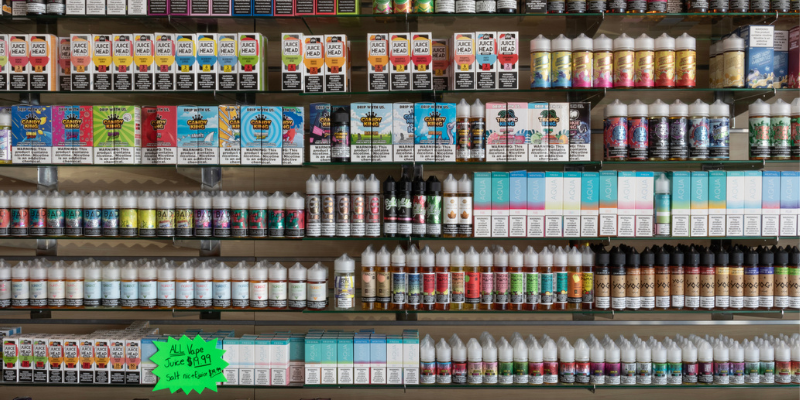Denver is the latest of several Colorado cities to ban the sale of most flavored tobacco and nicotine products, which especially put younger people, new smokers, pregnant women, and diverse communities at risk, according to leaders of the University of Colorado Cancer Center.
In December 2024, the Denver City Council, following a public hearing attended by more than 100 people, voted 11-1 to approve a measure prohibiting the sale of flavored e-cigarettes (known as vapes); flavored cigars, chews, and pouches; and menthol cigarettes within the city, and Mayor Mike Johnston later signed the bill. Sales of flavored hookah products are not covered by the measure.
Aspen, Boulder, and Golden are among several other Colorado communities that already restrict flavored tobacco sales, which remain legal elsewhere in the state for consumers age 21 and older.
CU Cancer Center Director Richard Schulick, MD, MBA, says that tobacco use “continues to be a leading cause of preventable death in the United States. Flavored tobacco products are fueling this public health crisis.”
Schulick adds that various flavored tobacco products have been marketed to youth, communities of color, LGBTQ people, and pregnant women. “Eliminating all flavored tobacco products, including menthol cigarettes, will save lives and reduce health disparities,” he says.
Candy, watermelon, cereal flavors
Jan Lowery, PhD, MPH, assistant director for dissemination and implementation for the CU Cancer Center's Office of Community Outreach and Engagement (COE), was in attendance for the council vote. She says she hopes the ban serves as a deterrent for young people who might otherwise be tempted to try tobacco products.
About 20% of high school students who vape say they do so “because of the cool flavors and the marketing that goes along with it, plus it looks like candy,” Lowery says.
Vape juice used in e-cigarettes comes flavored like various kinds of candy, watermelon, pancake, and popular breakfast cereal varieties, among many other flavors.
Lowery notes a recent survey reporting a decline in vaping rates across the state among high schoolers, but the trend is not uniform, with usage rates particularly alarming in some rural and mountain areas. Vaping rates are highest among young adults ages 18 to 24.
‘It’s so powerful’
Tessa Crume, PhD, MSPH, an associate professor at the Colorado School of Public Health, says that flavored tobacco products also disproportionately impact pregnant women. “They’re targeted as teenagers and youth, who get a pretty crushing addiction at a young age to a product that delivers a lot of nicotine, and then a lot of them get pregnant,” she says.
Crume leads the Colorado version of the Baby & Me Tobacco Free Program, which offers free, personalized counseling for pregnant women who smoke along with incentive gifts for quitting and staying tobacco free, followed by testing to show participants if nicotine levels in their bodies are being reduced. The program is funded by a state grant that’s administered through the CU Cancer Center.
→ CU Anschutz Study Shows Vaping Nicotine While Pregnant May Impact Fetal Development
Crume testified at the council meeting on her own behalf in favor of the flavored tobacco ban. “I felt really proud of Denver for being willing to take this step,” she says. “It’s so powerful. I wish that more communities would consider it.”
A bill introduced in the Colorado legislature in 2022 would have banned flavored tobacco sales statewide, but it failed to pass, and Gov. Jared Polis said at the time that he thought the issue should be decided locally. Six states, including neighboring Utah, currently restrict the sale of flavored tobacco in various ways.
‘It’s hard to quit’
While vaping is sometimes held to be less harmful than smoking cigarettes, the U.S. Centers for Disease Control and Prevention says no tobacco products, including e-cigarettes, are safe, and that e-cigarettes should not be used by youths, young adults, and pregnant people. Studies show that many adults who start using e-cigarettes as a way to quit smoking cigarettes instead wind up both vaping and smoking. And research is lacking on the health effects of long-term vaping.
“Kids who vape are seven times more likely to become cigarette smokers than kids who don’t,” Lowery says. “There’s a high level of nicotine in these products, and it’s hard to quit.”
In 2023, the CU Cancer Center’s COE office rolled out a smartphone app called 2Morrow Health which uses a behavioral model called “acceptance and commitment therapy” to help users quit smoking and vaping. The app can be accessed for free online across Colorado.
→ Your Phone Could Help You Hang Up on Smoking
Lowery says the cessation program has been expanded under the name Be Strong for Tomorrow. In addition to offering the app, she says, “COE will come out and offer education in your schools and your community about the adverse effects of vaping. We’ve had focus groups with youth to recreate our messaging so that it resonates more strongly with them. It’s a statewide program, but we’re especially trying to target rural and mountain communities where vaping rates are higher.”
Denver’s new flavored tobacco ban is scheduled to go into effect March 18. Meanwhile, Denver business owners who oppose the ban are gathering signatures to put a measure on the ballot that would overturn the ban. They have until March 19 to submit their petitions.
“So much great work has been done in Colorado to bring down rates of tobacco use,” Lowery says. “I don’t want us to reverse all that great work.”






